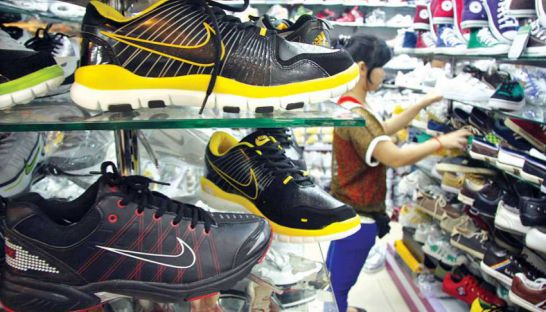Cambodia: GMAC makes run at duty-free access for footwear in the US
The industry body representing Cambodia’s garment sector met the deadline to submit a petition to the United States government yesterday asking it to extend the duty-free privileges of its Generalised System of Preferences (GSP) scheme to include footwear, a move that could boost the industry’s competiveness by giving local manufacturers an advantage in the world’s biggest consumer market.
The petition from the Garment Manufacturers Association in Cambodia (GMAC) comes as the United States is set to discuss both the annual renewal of its GSP scheme by the end of this year and the GSP Footwear Act of 2017, which was introduced to the US House of Representatives in May.
“GMAC strongly believes that this petition would receive positive responses from the US government in consideration of our continuous improvement in working conditions, especially the improvement in wage payment leading to further upgrading of the welfare of our workers,” the announcement said.
“If [the bill] is successful, it would tremendously help the Cambodian economy in terms of export growth, new investment and employment for thousands of Cambodians.”
The GSP Footwear Act of 2017 proposes broadening the annual renewal of the GSP programme to include footwear for the first time since the trade privilege scheme was introduced in 1976. If passed, the act would allow certain footwear products from selected countries with least developed country (LDC) status to enter the United States duty-free.
However, the bill has yet to gain traction with limited congressional support. Since it was first introduced to the House of Representatives, it has only earned sponsorship from three Democrats and four Republicans in the 435-member House, with no new recorded action since June when it was passed over to the House’s Ways and Means Committee. LDCs were given until yesterday to submit petitions to sway support for the bill, which will expire at the end of the year if it is not passed.
GMAC added in its petition that it has been consulting with a Washington-based law firm to help lobby on its behalf, and has received positive feedback that the House Ways and Means Committee and the Senate Finance Committee will renew the overall GSP scheme before it expires on December 31.
However, GMAC acknowledged that the GSP Footwear Act of 2017 would be a tough sell in Washington given that footwear remains a “sensitive industry in US trade policy” and due to the fact that the bill has low priority compared to congressional action on major health care reform and tax reform bills.
Nevertheless, Kaing Monika, deputy secretary-general of GMAC, said the industry body would continue to lobby until the end of this year and throughout 2018 if need be.
“Currently, the US grants GSP to us on many products, but most of these products we are not yet producing,” he said, referring to a duty-free list that includes over 5,000 products. “We are still a weak country when it comes to industry as we mainly produce garment and footwear, and these products are excluded from US GSP scheme.”
He added that GMAC was encouraged by the bill having received support from the American Apparel and Footwear Association and Outdoor Industry Association.
There are 59 dedicated footwear manufacturers in Cambodia that produced an export value of $700 million last year. However, less than 10 percent went to US buyers while the vast majority went to European and Japanese markets.
Miguel Chanco, lead Asean analyst for the Economist Intelligence Unit, said that if the US did include footwear into its GSP scheme it would help make the economy “slightly more resilient” by reducing the Kingdom’s dependence on garment manufacturing. However, he added that Cambodia’s political deterioration would likely stop the Kingdom from being included even if the bill were to pass.
“There’s really no harm in pushing now, or next year or the year after that,” he said. “That said, given the deteriorating political situation in Cambodia, I continue to doubt that these calls will bear any fruit.
“The opposition’s lobbying presence in Washington is arguably stronger and I suspect that they will try to convince US lawmakers to hold off on any trade privileges until the government allows for a more genuine democracy,” he said.
Source: http://www.phnompenhpost.com/business/gmac-makes-run-duty-free-access-footwear-us


 English
English




